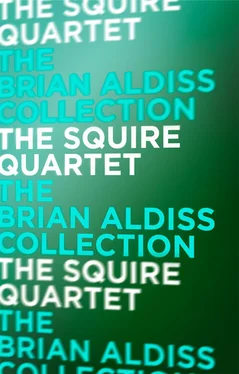After their conversation, Squire descended through the Lebanese hall and out into the London street. It was October and the leaves were falling. Everything was tranquil. There was no sign of Teresa. He walked slowly to the car, waiting by a parking meter, and climbed in. He allowed himself to relax and think nothing. Eventually she returned, dangling a carrier bag.
‘Sorry if I kept you waiting, darling. I’ve been shopping.’
She settled herself into the passenger seat and showed him a small glass ornament she had bought.
‘That yoga man was too boring. He’s a real phoney – you won’t use him, will you? I couldn’t bear it when he went into religion.’ She rubbed against him and kissed him on his neck.
‘Did you have to walk out like that? It was impolite. Saloman was okay. He said that we should go to India.’
‘Let’s go back to the hotel. I wasn’t being impolite to him – or you. I just suddenly got fed up with being there. I suppose you would say it was ideological. I went there with you to please you; I sat there to please you. Suddenly I wanted to be central. You and he were having a great conversation, and I was just sitting there waiting for you to finish. I couldn’t bear being an appendage.’
He looked at her with concern. ‘You weren’t an appendage. I don’t see why you didn’t enjoy it. He was interesting, was our Doctor.’
‘Not to me he wasn’t,’ she said.
Squire frowned. ‘Really, Tess. Just for half-an-hour? You’re as involved with religious questions as anyone.’
She put an arm around him. ‘Tommy, be nice to me. Don’t be grim. Religion’s just not something I wanted to talk about. In any case, I hated the way that man stared at me; he was sinister, and if you’d been a woman you wouldn’t have liked it either. He looks like a murderer.’
‘That’s silly, when—’
She sighed. ‘All right, it’s silly. Let’s go back to the hotel. My feet ache, and I need a drink.’
As he reached the British Consulate, he thought ruefully, ‘Well, there was a time when I also found religious talk extremely tedious.’ But perhaps that wasn’t what Teresa had been trying to tell him.
The Consulate was an unimposing building in greying stucco, hiding behind a number of sabre-leaved shrubs which entirely filled the small garden. The gate was locked. He spoke into a grill; the gate opened. He was met at the door by a solid unspeaking man, and shown into a hall whose chief features were a small chandelier and a portrait of the Queen and Prince Philip.
In a minute, James Rotheray appeared, rubbing his hands and smiling with his head slightly on one side in a manner that Squire remembered from schooldays. They shook hands. Rotheray put an arm round Squire’s shoulders and led him through the house to an enclosed courtyard where two men were sitting drinking. Rotheray introduced them to Squire and then led him to another table.
‘Lovely to see you, Tommy, you’re looking first-rate.’
‘And you, Sicily evidently agrees with you.’
‘Sicily’s splendid, full of antiquities. Getting a bit grey round the temples.’
‘Me too. And a bit thin on top. Do you still run?’
‘No. Jogging hasn’t caught on in Ermalpa. We sometimes manage a scratch game of cricket. I suppose the last time we met was at the Travellers.’
‘My Uncle Willie’s birthday dinner.’
Squire and Rotheray both belonged to the Travellers’ Club.
Rotheray brought drinks and concluded the pleasantries by saying, ‘It’s frightfully kind of you to come round. We have laid on just a few people for dinner – a dozen, no more – who are looking forward to meeting you and having a chat. It’ll all be jolly pleasant, and we have a really good chef. So before we go any further, if you like, we’ll talk about … what I know you want to talk about. I’ve got my secretary here, who can give you official advice. He’s a first-rate chap.’
He called over one of the men at the other table, a young man with a massive handshake who was introduced as Howard Parker-Smith. Squire recognized the type, or hoped he did: well-muscled body under well-tailored suit, uncompromising attitude under well-bred politeness: and felt pleased that such men still prospered.
‘Bring your drink over,’ he said to Parker-Smith. Parker-Smith went and fetched a beer.
‘Cigarette, sir?’ said Parker-Smith, offering a packet. Squire refused, Rotheray took one.
‘I’m particularly interested in the two Russians attending the conference,’ Squire said. ‘What have you got on them?’
Parker-Smith produced a neatly folded sheet of typed paper from his jacket pocket, laid it on the table in front of him, and said, without giving it a glance, ‘Georgi Mihailovic Kchevov. We’ve got quite a lot on him, although he’s only a minor ugly. Born 1935, in a town called, encouragingly, Proletarsky, in South Russia. Quite near the border with the Ukraine. Both parents killed 1943 in Great Patriotic War.’
‘I don’t need a life-story,’ Squire said.
‘Well, speaks German, some Polish, and Bulgarian. No English as far as is known. First sent outside USSR about five years ago, did heavy work in Gdansk among dock workers, earned promotion. Returned to Russia to KGB Advanced Technical College in Sudzhensk for one year refresher and on cadre there briefly. He played in an orchestra there.’
‘What’s that?’ Squire asked.
‘Comrade Kchevov plays the violin. Played in Kursk Youth Orchestra, 1944, for example. Also with him in the Sudzhensk Technical Orchestra was one Luyben Konstantinov, another habitual violin player.’
‘I know that name. Konstantinov.’
‘Luyben Konstantinov is Bulgarian. When he returned to Bulgaria from Sudzhensk, Kchevov went with him. This year, Kchevov materialized in Bonn a month before the Bulgarian defectors were killed in London and Paris. Kchevov was one of the forward men acting for Konstantinov, who master-minded the killings from Sofia.’
Squire rested his elbows on the table and ran his fingers down the lines of his face.
‘Let’s have that again, more slowly. What’s all this about the Bulgarians? How do they come into it?’
For a moment, Parker-Smith allowed himself to display a little impatience.
‘You must surely remember the case of Georgi Markov, a Bulgarian defector who worked for the BBC and Radio Free Europe. Killed by a poison pellet in the heart of London. Konstantinov master-minded that operation from Sofia. He runs Department Two – Counter-Espionage. Of course, it’s lousy with Russians. Bulgaria’s owned, lock, stock, and barrel, by the KGB. Which is how Georgi Kchevov got in on the act.’
He spoke with the air of one stating the obvious, looking searchingly to and fro at Rotheray and Squire.
‘So Georgi Kchevov is quite important,’ Rotheray said.
‘Not really, James,’ Parker-Smith said. ‘He was only middleman in a chain of command, probably didn’t know a lot of what went on. Certainly didn’t do any of the hits. His hands are clean by KGB standards. He’s probably here on holiday, more or less. Reward for being efficient. But possibly keeping an eye on Rugorsky to justify the trip. Speaks fluent Italian, of course.’
‘Okay. He flew here straight from Bonn?’
Parker-Smith shook his head. ‘He’s been living in Milan under an alias since May. He didn’t like Bonn – the good old Krauts leaned on him. He linked up with Rugorsky only yesterday, at Rome airport. We and the Americans had tabs on him. Chaps like Kchevov know that security’s slacker in Italy than north of the Alps, so they aren’t quite so watchful here. After all, country’s half-communist anyway.’
He caught a glance from Rotheray, fell silent, and sipped his beer.
Читать дальше












